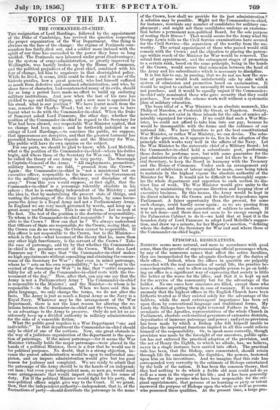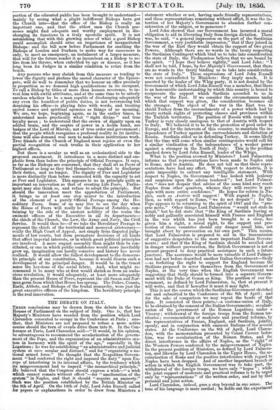EPISCOPAL RESIGNATIONS.
NOTHING seems more natural, and. more in accordance with good sense, than the practice of superannuating official personages when, by any of the numerous causes that affect the active faculties, they are incapacitated for the adequate discharge of the duties of their office. Indeed, when the offices in questiOn are palpably connected. with the real necessities of social life, the practice be- comes imperative ; and to allow an incapable person to go on hold- ing an office is a significant way of expressing that society is little the better or the worse for the office, and that it is kept up not for the service of the community but for the advantage of the holder. No one cares how sinecures are filled, except those who have a chance of getting them in case of vacancy. It is a curious anomaly that the highest offices in the English Church have been hitherto treated as if they existed solely for the advantage of the holders, while the most extravagant importance has been set upon them by conventional language and traditional forms. My. Lords the Bishops have been right reverend Fathers in God, de- scendants of the Apostles, representatives of the whole Church in Parliament, absolute ecclesiastical governors of extensive districts, depositaries of immense patronage and power ; and yet no provision has been made by which. a Bishop who felt himself unable to discharge the important functions implied in all this could relieve himself of the responsibility. Or, to speak more correctly, though provision was made by the foresight of our ancestors, public opin- ion has not enforced the practical adoption of the provision, and. the act of Henry the Eighth, to which we allude, has, we believe, never in a single instance been carried into effect. The practical rule has been, that the Bishop, once consecrated, should retain through life the emoluments, the dignities, the powers, bestowed upon him on his investiture. And we imagine that this rule has corresponded very correctly to the estimate of Bishops entertained lay the bulk of the nation. It has been the common theory, that they had nothing to do which a feeble old. man could not do as well as a man in the vigour of his life ; and it has been generally- the theory of the persons who have been responsible for the on- ginal appointments, that persons of no learning or piety or talent answered the purpose of Bishops upon the whole as well as persons who possessed these qualities. At the present time, a large pro- portion of the educated public has been brought to understand— mainly by seeing what a plight indifferent Bishops have got the Church into—that the office of the Bishop is really an important one and that the ablest men the Church pos- sesses might find adequate and worthy employment in dis- charging its functions in a truly apostolic spirit. It is not astonishing that with this growing sense of what a good Bishop could accomplish should arise an impatience of incapacitated Bishops: and the bill now before Parliament for enabling the Bishops of London and Durham to make way for successors is only, to meet an emergency, an instalment of a larger measure, that will for the future render it as incumbent on a Bishop to re- tire from his throne, when enfeebled by age or disease as it has long been for Judges in a similar condition, to retire from the bench.
Any persons who may shrink from this measure as tending to lower the dignity and profane the sacred character of the Episco- pate, will do well to remember that we honour an office precisely in proportion as we demand high qualifications in its occupant. To call a Bishop by titles of more than human reverence, to in- vest him with awful attributes, and at the same time to be utterly careless whether he be a man capable of discharging adequately any even the humblest of public duties, is not reverencing but despising his office—is playing false with words, and treating sacred names and spiritual agencies as things of no meaning. We are, we hope, beginning again, as in the earlier times to understand more practically, what "right divine" and tine loyalty mean ; to understand that the crown of dignity upon an addled brain, and the sceptre of power in a feeble hand, are badges of the Lord of Misrule, not of true order and government ; that the people which recognizes a profound reality in its institu- tions will also demand real men to make those institutions work. True friends of the Church of England must rejoice at even the
m/ ' recognition of such truths in their application to her • hest offices.
But there is a secular as well as an ecclesiastical side to the proposed enactment. It introduces in a more distinct and em- phatic form than before the principle of Official Peerages. It says, so far as the Bishops are concerned, that they shall sit as Peers of Parliament so long as they feel themselves enabled to discharge their duties, and no longer. The dignity of Peer and Legislator is more distinctly than before connected with the capacity to act as Peer and Legislator. This appears to us in principle quite as important an innovation as that of creating Life Peers. Parlia- ment may also think so, and refuse to adopt the principle. But should the innovation meet the approbation of Parliament, it brings us at least one step nearer to the introduction of the element of a purely Official Peerage among the He- reditary Peers. Some of us may live to see the day when the House of Peers will really be the House of Notables con- taining by the side of the ancient nobility of the realm the eminent officers of the Executive in all its departments— the chiefs of the Church, the Law, the Army and Navy, the Civil Service. It would then be—if we take the Hereditary Peerage to _represent the chiefs of the territorial and moneyed aristocracy— really the High Court of Appeal, not simply from disputed judg- ments of law courts, but from prematun decisions of all kinds that affect imperial interests, or in which great political principles
• are involved. A more august assembly than might thus be con- stituted, or one in which public confidence would more inevitably grow up, imagination can hardly conceive and history has never realized. It would allow the fullest development to the democra- tic principle of our constitution, because it would disarm such a , development of its principal danger. It would be in the truest _sense the keystone of the social fabric. And, what might re- commend it te many who at first would shrink as from an auda- cious revolution, it would adequately, at least more adequately than the present House of Peers, represent the old Saxon and Nor- man germ from which that House has sprung. The Dukes, Counts, Earls, Abbots, and Bishops of the feudal monarchy, were just the great executive officers of the kingdom, The hereditary principle is the real innovation.



























 Previous page
Previous page